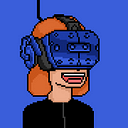Tetris as Therapy for PTSD
Early studies suggest that playing visuospacial games can interrupt memory processing immediately after a traumatic experience, drastically reducing PTSD flashbacks.
One of my earliest memories of gaming has little to do with a particular platform or hardware. I’m laying on my bed, trying to sleep, and all I can do is arrange Tetris pieces in my mind. Have you experienced this as well? Turns out the phenomenon is so widespread it has been clinically documented.
Unsurprisingly, years later I found out I wasn’t the only one slightly disturbed by the influence this particular game seemed to have on a human brain. In 2009, clinical psychologist Emily Holmes suggested (after showering some unfortunate strangers with grim footage of accidents and surgeries) that playing Tetris could interrupt memory processing immediately after a traumatic experience. She went back to it in 2016, this time backed by tests executed in an actual emergency room (where survivors of car crashes awaited.) You can read her work here.
What Holmes found out was that it takes about six hours for a memory (good or bad!) to be consolidated, during which time the process of storing it can be interfered with. Because of its high visuospatial demands, Tetris was considered a prime candidate for this test.
Thirty-seven participants were randomly chosen to play about 20 minutes of Tetris on Nintendo DS while they were in the hospital. The other 34 recorded their activities in a log (reading, texting, getting care, chatting, or doing a crossword puzzle.)
When a week had passed, the Tetris group was experiencing flashbacks about the accident they had been in about 8.7 times during the week. The loggers, though, reported 23.3 upsetting flashbacks for the same period (that’s a 62% reduction for playing just 20 minutes of Tetris!)
The author suggests that the brain’s ability to lay down the foundations of PTSD get interrupted by having to use the same pathways to concentrate on playing Tetris. A bit like a “cognitive vaccine,” hijacking the visual and spatial processing power of the brain in a way blocks bad memories even before they are fully formed.
You know what relief sounds like? It sounds like Korobeiniki ;)
